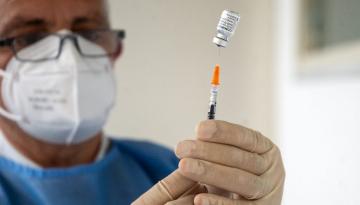Chris Hipkins says he's worried about the speed of the vaccine rollout - but not because it's going too slow.
The COVID-19 Response Minister on Tuesday said last Friday 16,000 doses were dished out - a new record in New Zealand - and there's a chance the country could run out before the next shipment from supplier Pfizer arrives.
"Based on what we've got in the country and what we're expecting to get between now and the end of June, it's possible by late June we will have a supply problem," he told The AM Show.
"But it's possible we may be able to manage it so we don't run out."
Without community transmission of the virus, New Zealand has been in the envious position of not having to rush its vaccine rollout to prevent death and illness. Other countries gave emergency approval to various vaccines, only to find some had serious potential side-effects that didn't emerge in the trials.
New Zealand initially signed agreements with four suppliers - Pfizer, Janssen (subsidiary of Johnson & Johnson), Novavax and AstraZeneca.
The Janssen and AstraZeneca vaccines have made headlines after reports of patients developing blood clots - rare enough the problem didn't show up in the trials, and still far less common than in COVID-19 patients, but enough to prompt a number of countries to stop using them.
The Novavax vaccine is still in the trial phase, and isn't even expected to seek emergency approval in the US until June.
New Zealand in early March said it would only use the Pfizer vaccine.
"That's proving to be a very good decision - Pfizer's proving to be one of the most effective vaccines on the market," said Hipkins.
The drawback is the decision was made after the vaccine rollout had already begun in February. Other countries, such as the UK, US and Israel, had already put their massive orders in too.
"That did mean we had to secure extra supply, extra stock of the Pfizer vaccine, and we were only able to do that in that sort of July through to September period," said Hipkins.

He said health officials are working hard to ensure the rollout isn't interrupted.
"There may be a period of a couple of days, a week, maybe two weeks at the outside I think, where we have to slow down a little bit while we wait for more vaccines to arrive... Supply has been by far the biggest constraint here. As soon as we get big quantities of vaccines in the country, the evidence suggests that DHBs are ready to ramp up. When they're getting up around 16,000 a day, that's a good sign.
"That movement from doing 5000 or 6000 a day to doing up to 16,000 a day, that happened quite quickly - over a couple of weeks. As long as that trajectory can continue through July and August, we should be starting to see really big numbers by August."
There have been reports of anaphylaxis triggered by the Pfizer vaccine, but it's treatable and like other serious side-effects, extremely rare.
Third shot?
The most recent wave of COVID-19, driven by huge outbreaks in Brazil and India, has been the biggest yet in terms of infections.
Hipkins said if the world can't get the virus under control, it increases the likelihood a third shot might be required next year. A typical course of the Pfizer vaccine takes two shots.
"It's possible people will need a booster shot if the vaccine doesn't prove effective against all of the new variants - bearing in mind that around the world, the faster the [virus] spreads in those countries that have very low vaccination rates then the more variants there are, the faster it mutates and therefore the harder it is for the vaccine to keep up.
"So it's possible that booster vaccines may be required sometime next year to make sure we're covering off those variants."
Luckily, the Pfizer vaccine - developed with German company BioNTech and using a relatively new technology called mRNA - has been holding up well against the variants to date. It's 89.5 percent effective against the UK variant and 75 percent against the South African - lower than its 95 percent effectiveness against earlier forms of the SARS-CoV-2 virus, which causes the disease.
But there the new variant that's emerged in India is even better at evading vaccines, including Pfizer's.
"I don't want to trigger everybody starting to worry that the vaccine's not effective. As of now it is still very effective, it's still stacking up very well. There's a possibility we'll need booster shots," said Hipkins.
"At this point, we just don't know."




